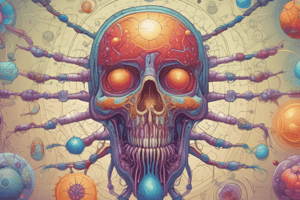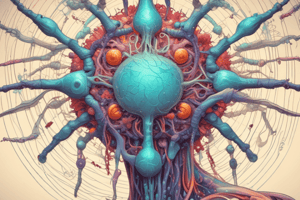Podcast
Questions and Answers
What defines the immune system?
What defines the immune system?
- The study of immune responses to pathogens
- The coordinated reaction of cells to microbes
- The ability to prevent infections and eradicate established infections
- The collection of cells, tissues, and molecules that mediate resistance to infections (correct)
Which barrier mentioned is part of innate immunity?
Which barrier mentioned is part of innate immunity?
- Acidic pH of the stomach (correct)
- Lymphocytes
- Effector T-cells
- Circulating antibodies
Which characteristic does NOT describe acquired immunity?
Which characteristic does NOT describe acquired immunity?
- It is only triggered if microbes pass through epithelial barriers
- It develops quickly and early (correct)
- Activated T lymphocytes eliminate microbes living inside cells
- Antibodies eliminate microbes in extracellular fluids
What is the main defense mechanism of humoral immunity?
What is the main defense mechanism of humoral immunity?
What is the function of T-lymphocytes in cell-mediated immunity?
What is the function of T-lymphocytes in cell-mediated immunity?
What is the primary function of the immune system?
What is the primary function of the immune system?
Which type of immunity develops slowly and later?
Which type of immunity develops slowly and later?
Which cells are primarily involved in cell-mediated immunity?
Which cells are primarily involved in cell-mediated immunity?
Which component is involved in the chemical killing of pathogens in innate immunity?
Which component is involved in the chemical killing of pathogens in innate immunity?
What is the main defense mechanism against extracellular microbes in humoral immunity?
What is the main defense mechanism against extracellular microbes in humoral immunity?
Flashcards are hidden until you start studying
Study Notes
Overview of the Immune System
- The immune system is a complex network of cells, tissues, and organs that work together to defend against pathogens.
- It is divided into two main types: innate (or nonspecific) and acquired (or specific) immunity.
Innate Immunity
- The skin serves as a primary barrier in innate immunity, preventing pathogen entry.
- Innate immunity acts as the body's first line of defense, responding quickly to potential threats.
Acquired Immunity
- Acquired immunity develops over time and offers long-lasting protection.
- It is characterized by specificity and memory, allowing for a stronger response upon subsequent exposures.
Humoral Immunity
- The main defense mechanism of humoral immunity is the production of antibodies by B-lymphocytes.
- Antibodies neutralize pathogens and mark them for destruction.
Cell-Mediated Immunity
- T-lymphocytes are crucial in cell-mediated immunity, recognizing and responding to infected or cancerous cells.
- They directly attack infected cells, promoting apoptosis and orchestrating the immune response.
Primary Functions of the Immune System
- The immune system's primary functions include identifying and eliminating pathogens, protecting against infections, and removing damaged cells.
Slow-Developing Immunity
- Acquired immunity develops slowly and has a delayed response, enhancing its effectiveness with repeated exposures to the same pathogen.
Key Cells in Cell-Mediated Immunity
- T-lymphocytes, including cytotoxic T cells and helper T cells, are the primary cells involved in cell-mediated immunity.
Chemical Killing in Innate Immunity
- Components such as cytokines and defensins participate in the chemical killing of pathogens during innate immune responses.
Humoral Defense Against Extracellular Microbes
- The main defense mechanism against extracellular microbes in humoral immunity is the action of antibodies, targeting and neutralizing invaders.
Studying That Suits You
Use AI to generate personalized quizzes and flashcards to suit your learning preferences.




